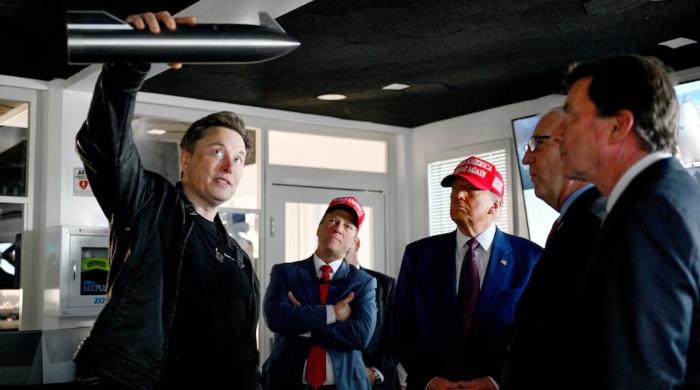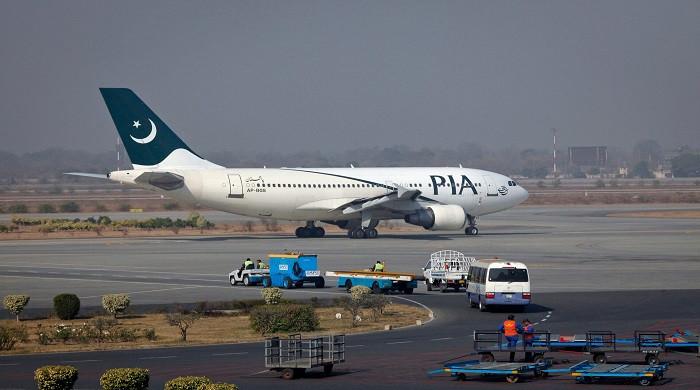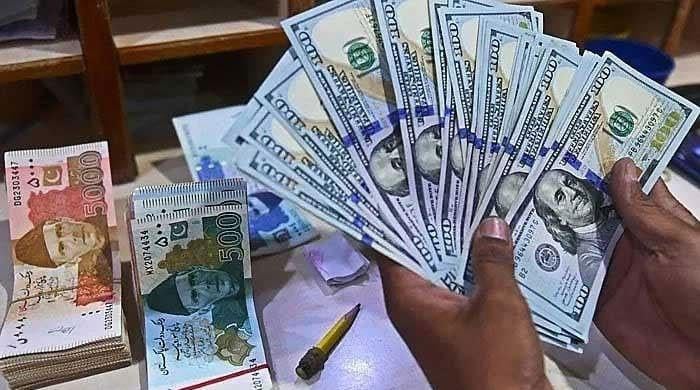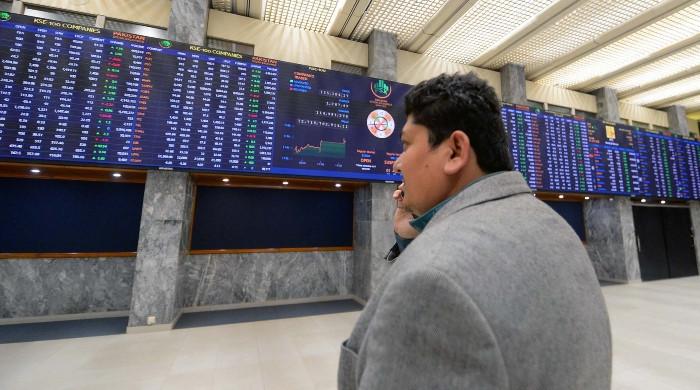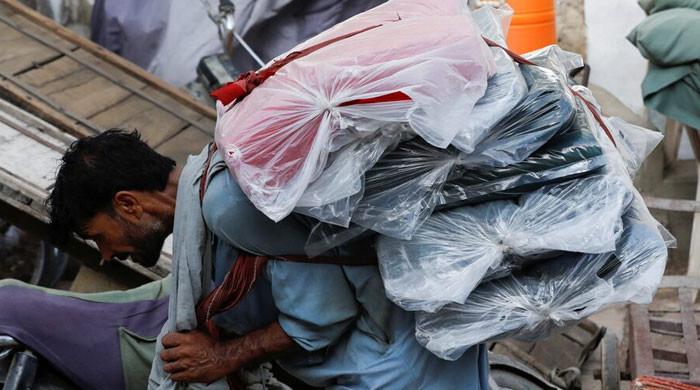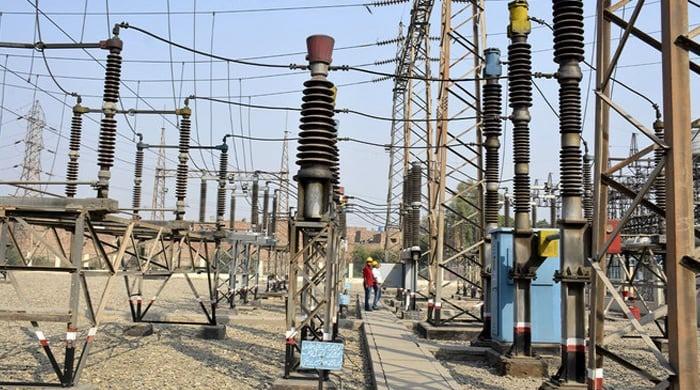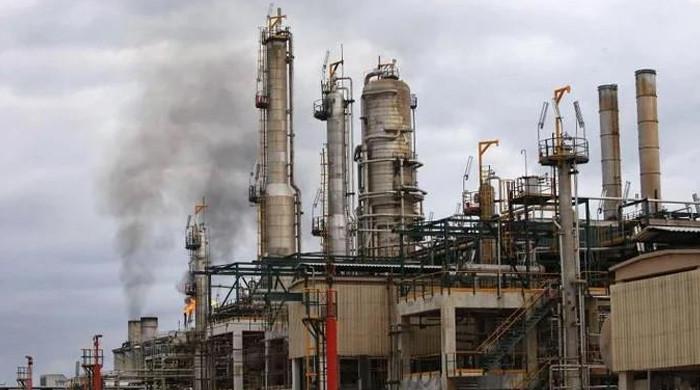Economic Survey 2021: 'V-shaped' recoveries in services, manufacturing boost 3.94% growth in GDP
Finance Minister Shaukat Tarin says the poor are going to be the government's 'number one' priority in budget tomorrow
June 10, 2021
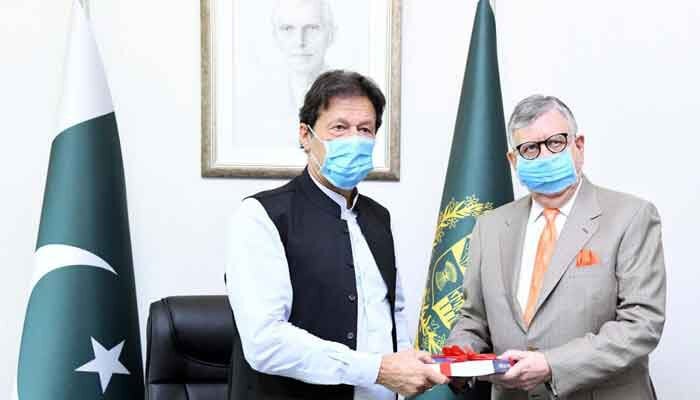
ISLAMABAD: A day before the hotly anticipated budget for fiscal 2022, Finance Minister Shaukat Tarin on Thursday unveiled the Economic Survey of Pakistan, revealing that strong V-shaped recoveries in the services and manufacturing sectors helped the economy expand 3.94% despite much lower estimates from both the government and international lending agencies.
Cognisant of the peculiar circumstances in which this unexpected growth came about, the minister opened his press briefing by speaking highly of Prime Minister Imran Khan's policies in combating the coronavirus pandemic, which he credited as being the major force behind the better-than-expected recovery.
KEY POINTS
- COVID rendered 20 million people jobless, says Tarin.
- However, working population is back to 53m out of the total 55m labour force when the pandemic began, he says.
- Economy grew more than the government's, IMF's and World Bank's expectations.
- Agriculture growth measured at 2.77% despite large-scale losses in cotton crop.
- Exports increased, but remittances grew by a significant 29%, providing a boost to forex reserves.
- FBR collected an unprecedented Rs4.2 trillion in 11 months of the outgoing year.
- Pakistan's stock market is currently the best-performing in Asia, fourth-best in the world, he says.
- The poor will be number one priority for us in tomorrow's budget, says Tarin about government's economic priorities.
- IT industry growing by 40-50%, we want them to grow by 100%, he says.
- Power is a "black hole" sector; we overbuilt and are now making crippling capacity payments, says finance minister as he speaks on power reforms.
- FBR harassment has to end; audits will be conducted by third parties, says Tarin.
The finance minister noted that millions of citizens lost their jobs when the pandemic hit Pakistan; however, due to the prime minister's "visionary policy" of not imposing a complete lockdown across the country, millions of people who were unemployed found jobs again.
He noted that the government had itself expected the economy would grow by 2.1% this year, while the IMF and World Bank had released even more conservative estimates.
Nonetheless, the economy grew by a robust 3.94% "due to the far-sighted policies adopted by the government, which included incentivising manufacturing, subsidising electricity and providing assistance to the agriculture sector," Tarin said.
Agriculture managed to post decent gains, but slightly missed the targeted growth rate due to wide-scale losses in cotton crops.
Meanwhile, after a depressing two years, "Large scale manufacturing grew by nearly 9%," he noted, supported by growth in a large basket of industries.
Tarin praises growth in remittances, says Pakistan wants to become a food exporting nation once again
Tarin noted that remittances to Pakistan had broken records in the outgoing year, and had crossed the $26bn mark.
"This shows the confidence and special relationship that overseas Pakistanis have in Prime Minister Imran Khan," said the finance minister.
However, imports, especially of food, increased sharply this year, putting significant burden on the balance of trade.
"We were net exporters of food, but now have become net importers," he said. He explained that due to Pakistan's increased exposure to international food markets as a result of this change, it had become vulnerable to global price shocks. However, he stressed that the government had nonetheless absorbed much of the inflation in international food prices to provide relief to the citizenry.
The finance minister also addressed criticism that the government was taking on unprecedented debt.
He said it was inevitable that debt would rise considering there was a fiscal deficit in the country.
However, "Total debt has only increased by Rs1.7tr from 2020-21," he stressed, adding that this was a huge improvement compared to previous years.
"I'm not saying it's a commendable thing that debt is growing," he clarified. "I am not saying that. But you can see stability [in the economy] returning slowly," he added.
He said both mobile phones and broadband subscribers have registered sharp increases in Pakistan, adding that this showed that market penetration of these services have increased.
Tarin speaks on Ehsaas programme, stresses on 'sustainable economic growth'
Tarin also spoke highly of the government's Ehsaas povery alleviation programme, noting that the World Bank had described it as "one of the best and the largest" poverty alleviation initiatives across the globe.
"Full credit goes to Sania Nishtar," he said, adding that handing out cash to 15m people during a crisis was no mean achievement.
The finance minister said he had spoken to the prime minister about moving Pakistan towards growth.
"Till when will you stabilise the country? Unless we move towards growth of 5%, 6%, 7% and 8%, the large population of our youth will not get jobs," he added.
Tarin said Turkey, China and India were nations who underwent sustainable economic growth over the past 20-30 years.
"When did we grow [sustainably]? We have only obtained loans and credit for the past few decades [to finance growth]," he said.
Tarin also spoke of the 'failure' of trickle down economics in Pakistan's context, saying that the idea works in countries which experience sustained periods of upward growth momentum.
Given that Pakistan has only grown in fits and spurts, the poor have yet to benefit from any trickle down benefit from past government policies.
"We will show this country how it [poverty alleviation] is done," he said.
"In this growth, the poor will be 'number one' for us, and this growth will trickle down to them," he said.
Finance minister wants IT industry to grow by 100%, says power sector a 'black hole'
Tarin spoke briefly about the booming IT industry, noting that it had registered growth of 40% but by the next budget, he intended for it to grow by 100%.
"India, in 2010, earned $1bn through IT exports. Today, they are earning $100bn through them. If they can grow 100 times, can't we grow our IT industry by 40 or 50 times?" he asked.
Speaking about energy challenges, Tarin said Pakistan's economy was burdened due to overcapacity in the power sector, saying that "it was a very big challenge and a black hole" for Pakistan.
"We have to continue to make capacity payments as a result [of past policies]," he said, adding that even if Pakistan continued to grow at 4,5 or 6% in the next couple of years, the extent to which Pakistan had overbuilt, it was not possible for the country to utilise that capacity.
Nonetheless, Tarin said the government will not resort to increasing tariffs time and again to cover the shortfall, noting that it will have a cascading effect on inflation.
"Indirectly, even the poor will be burdened with inflation over tariff increases, even if we find a way to protect them from any direct impact," he said, adding that the government will take 7-8 years to eliminate circular debt.
He said Pakistan was trying to improve the performance of energy distribution companies still held by the state and sell them at a profit to private enterprises.
The finance minister said China was outsourcing 85mn jobs and Pakistan wanted to avail this opportunity. Tarin said Pakistan had sought feedback from Chinese manufacturers, asking them what facilities they needed to invest in the Special Economic Zones (SEZs) set up under CPEC.
"We also want to earn dollars as well," he said, adding that for that to happen, Pakistan will have to increase non-traditional exports and at the same time, invite direct investment.
Tarin on state-owned enterprises, IMF negotiations
Tarin rejected criticism on the government's initiative to privatise state-owned enterprises (SOEs), adding that when these institutions are handed over to politicians, they like to wield influence over them and as a result, destroy these institutions in the process.
In response to a question, Tarin said Pakistan's negotiations with the IMF were ongoing, adding that the international money lender had asked the government to hike tariffs and increase taxes.
The finance minister said Pakistan and the IMF want the same thing — sustainable growth — but the country cannot afford to increase taxes or hike tariffs and the poor and salaried classes cannot be allowed to take on an additional burden in the form of inflation.
"This is a red line for the prime minister," he said. "We will not further burden the poor," he added.
FBR harassment to end, promises finance minister
Speaking about the FBR, Tarin said he would end the practice of people being harassed by the bureau.
"FBR will not audit [businesses or persons] but a third-party audit will be conducted," he said.
He said that once the third-party conducts its audit and finds a party guilty, that individual will be thrown into jail.
Answering another question, Tarin said it was fair to ask how he can privatise state-owned enterprises when all others, before him, promised to do the same but failed to.
"Nawaz Sharif used to shout the same slogan during the first time [when he was prime minister] and then for a second time [when he again became the prime minister] and then a third, but nothing happened," he conceded.
However, Tarin said he will be able to pull it off as he had played a key role in privatising large commercial banks across Pakistan, successfully, and believes he has the insight necessary.
Earlier, the finance minister had called on PM Imran Khan where he spoke to him about the survey. Special Assistant to the Prime Minister on Revenue Waqar Masood was also present in the meeting.
Correction: An earlier version of the story reported the GDP growth rate as 4.4% instead of 3.94%. The error has been rectified and is regretted.




